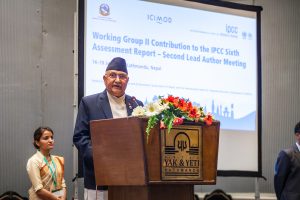Infighting in the ruling Nepal Communist Party (NCP) has reached unprecedented levels. The party appears to be on the verge of a split that could threaten the survival of the government in Kathmandu.
All eyes are on Prime Minister Khadga Prasad Sharma Oli, who is also chairperson of the NCP. The 10-day-deadline he was given by the NCP Secretariat to reply to a document submitted by party co-chair Pushpa Kamal Dahal, accusing him of flouting party norms and not honoring power-sharing agreements reached in the past, has ended.
Oli is due to present his response to the party secretariat on November 28. In the past, he has avoided showing up at party meetings. He may do the same on Saturday.
Over the past week, he is said to have been busy trying to shore up support for himself within the party and its top decision-making bodies. He is also looking outside his party for support. He met Nepali Congress (NC) party President Sher Bahadur Deuba. Although Oli’s spokespersons have said that the meeting was to discuss appointments to constitutional bodies, it has triggered speculation that he is hoping to run a coalition government with support from the opposition NC should the NCP split.
The NCP was formed in 2018 after Nepal’s two largest leftist, the Oli-led Communist Party of Nepal (Unified Marxist-Leninist) and the Dahal-led Communist Party of Nepal (Maoist Center) merged. Apparently, the two had reached a tacit understanding under which Oli and Dahal would share leadership of the NCP government’s five-year term. However, Oli did not step aside for Dahal at the end of two and a half years.
He has also refused to let go of control over the party, after agreeing under party-mediated agreements to give Dahal a free hand in the running of party affairs.
In late August, an NCP Standing Committee-appointed Task Force made some recommendations to break the deadlock. Its suggestions were essentially a rehashed version of a deal done in November last year. Still, it was a compromise that both sides agreed upon.
However, nothing changed on the ground. The task force recommendations were not implemented, and Oli has refused to keep his side of the bargain. Consequently, the infighting has re-erupted.
It is not just Dahal who is aggrieved with Oli. Neither is it only members of the CPN-MC, the party he led, who are jostling for more power. Among Oli’s critics today are old comrades of the CPN-UML. Madhav Kumar Nepal, Oli’s former ally against Dahal, is now standing alongside Dahal calling for Oli’s resignation.
Democratic politics in Nepal have been turbulent, with ambitious politicians breaking coalitions and bringing down governments with alarming frequency. Since 2008, for instance, Nepal has had 11 prime ministers.
The NCP has 173 seats in the 275-member Nepalese Parliament. While Oli reportedly has the support of 77 parliamentarians, Dahal and Madhav Nepal have the backing of 96 seats. Should the NCP split, the Oli government would be in trouble.
The NC, with 60 seats, could then emerge a king-maker. The problem is that the NC is also a divided party; Deuba’s autocratic leadership has many critics in the party. A vertical split in the NCP could lead to upheaval in the NC as well, especially if a section of NC parliamentarians are to extend support to Oli or Dahal.
Meanwhile, Nepal’s two giant neighbors, India and China, are busy wooing a government that is battling for survival.
Oli, who has been stoking an anti-India Nepalese nationalism to divert attention away from his poor governance, seems to have mended fences with India somewhat as evident by the string of high-level engagements between the Indian and Nepali governments over the past two months. He has not disclosed even to the NCP leaders what transpired in his meetings with Indian officials.
Meanwhile, the Chinese embassy in Kathmandu been intervening more openly in the political crisis. Chinese Ambassador to Nepal Hou Yanqi has repeatedly stepped in to defuse intra-party, intra-government crises in Nepal. Oli is reported to have agreed to attend the NCP Secretariat meeting on November 18 after a meeting with Hou.
Top officials from Delhi and Beijing are back in Nepal. India’s Foreign Secretary Harsh Vardhan Shringla was in Kathmandu on the eve of the crucial NCP Secretariat meeting scheduled for November 28. Chinese Defense Minister Wei Fenghe will be in Nepal’s capital a day after the Secretariat meeting.
While bilateral cooperation could be the focus of Shringla’s and Wei’s visits, the political crisis in Kathmandu is unlikely to escape their attention.

































